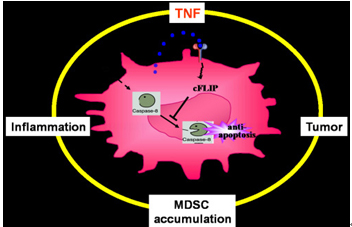On Oct. 15th, 2012, the Journal of Clinical Investigation (JCI) online-published a research article entitled “TNF signaling drives myeloid-derived suppressor cell accumulation”. This work is from Prof QIN Zhihai’s group in the Laboratory of Protein and Peptide Pharmaceuticals, Institute of Biophysics, Chinese Academy of Sciences. (http://www.jci.org/articles/view/64115)
Myeloid-derived suppressor cells (MDSCs) are important negative immune regulators, which are required for immune homeostasis. This group of cells is demonstrated to promote tumor progression by suppressing T-cell immune response, secreting immune suppressive cytokines like IL-10, or inducing the generation of regulatory T cells (Tregs). They are often observed accumulating in the spleen and tumor in situ of tumor-bearing mice or cancer patients, but the underlining mechanism remains unclear.
Proinflammatory cytokines such as TNF, IFNg and IL-4, are critical mediators and/or regulators of inflammation. Prof QIN’s group has been working for years on how they function on tumor cells, more importantly, on tumor stromal cells, thus influence the multi-stages of tumor development. A recent publication has shown that early exposure of high-dose IL-4 to tumor stroma can reverse the MDSC-mediated T-cell suppression and promote tumor rejection (Gene therapy, 2010).
In this publication, Prof QIN and his colleagues reported that the transplanted tumors are spontaneously rejected in mice deficient of TNF receptors (TNFR-/-), accompanied by an impaired peripheral MDSC accumulation in spleens and tumors. Adoptive transfer of TNFR-competent, but not TNFR-deficient MDSCs, can rescue the tumor growth in TNFR-/- mice. Further investigations show that this is caused by TNFR2 mediated regulation of c-FLIP/caspase-8 signaling (as figure illustrates). The results reveal one important mechanism that TNF maintains the peripheral accumulation of MDSCs, and provide a potential clinical target for treating cancer and inflammatory diseases.

Figure: TNF maintains the MDSC accumulation via TNFR2-dependent upregulation of cFLIP.
This work was supported by grants from the Ministry of Science and Technology of China, the Natural Science Foundation of China and Chinese Academy of Sciences.